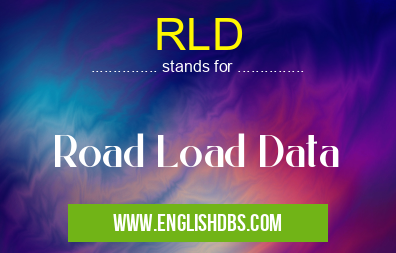What does RLD mean in UNCLASSIFIED
RLD stands for Road Load Data which is a type of data collection used to measure the response and performance of vehicles in different conditions. It involves collecting information such as acceleration, velocity, forces acting on the vehicle, engine power output, temperature, fuel consumption etc. In simple terms, RLD is used to measure the performance of vehicles when they are driven on roads. RLD is important for automotive manufacturers who need to make sure that their vehicles perform optimally while on the road and provide a comfortable ride for passengers.

RLD meaning in Unclassified in Miscellaneous
RLD mostly used in an acronym Unclassified in Category Miscellaneous that means Road Load Data
Shorthand: RLD,
Full Form: Road Load Data
For more information of "Road Load Data", see the section below.
Essential Questions and Answers on Road Load Data in "MISCELLANEOUS»UNFILED"
What is Road Load Data?
Road Load Data (RLD) is the term used to describe data recorded from vehicles during testing, representing the environmental conditions and driver inputs. RLD provides a realistic database of real-world driving conditions that engineers can use to develop and optimize vehicle performance.
What information does Road Load Data contain?
Road Load Data contains information such as vehicle speed, longitudinal or lateral acceleration, engine speeds, torque figures, gear positions, steering angles and other telemetry values.
How accurate is Road Load Data?
Road Load Data is extremely accurate as it records readings from vehicles under real-world conditions. This allows engineers to get an accurate picture of how a vehicle behaves when faced with different environmental challenges.
How is Road Load Data collected?
Road Load Data is typically collected through on-road testing where specially equipped vehicles take measurements of acceleration performance, brake performance and other parameters while driving in a variety of scenarios. The data collected can then be analyzed to help inform vehicle designs and validate vehicle models in terms of safety and system design decisions.
What types of vehicles are used for collecting the data?
Generally any type of road going vehicle can be used for collecting Road Load Data depending on the end application required. Commonly modified passenger cars are often preferred due to their more compact size and low cost compared to bigger commercial trucks or vans which require additional modifications such as trailer hitches or load carriers for testing purposes.
Does collecting the data require special training?
Yes, collecting accurate Road Load Data requires specialized knowledge about how to properly instrument and configure the test vehicle as well as knowledge about best practices for measuring data over various surfaces and terrains. It also requires understanding of how specific systems should be tuned in order to accurately measure performance metrics like traction control or electronic stability control where applicable.
Can computer simulation replace road testing with Road Load data collection?
While simulation has become increasingly important for product development over recent years it cannot completely replace the need for rigorous road testing using real world conditions captured by RLD collections . Even with high-end simulation tools able to accurately replicate certain systems or subsystems there can still be variance between simulated results versus real world results due to variations in geometry/road surface condition etc which cannot be replicated by simulation alone.
How do engineers use Road Load Data during product development?
Engineers use the insight gained from RLD during product development in many ways including helping inform decisions about suspension tuning , brake calibration , traction control strategies , temperature management strategies etc . By having access to highly accurate RLD datasets engineers have the ability to better understand how a product will behave in various environmental scenarios which helps ensure that products are rigorously tested prior to being released into production.
Final Words:
In conclusion, RLD (Road Load Data) plays an important role in helping automobile manufacturers understand how their vehicles will react and respond when driven under varying environmental conditions - something critical for reliable operation and decreasing emissions levels over time. While collected manually by drivers or technicians out on the roads years ago - now these types of test runs are usually done with computers onboard recording all sorts of vital metrics including acceleration rates, temperature readings and more across multiple road surfaces throughout a vehicle's test run period - all leading to greater efficiency gains over time as well as improved safety standard compliance from moving forward into newer models down the line up ahead.
